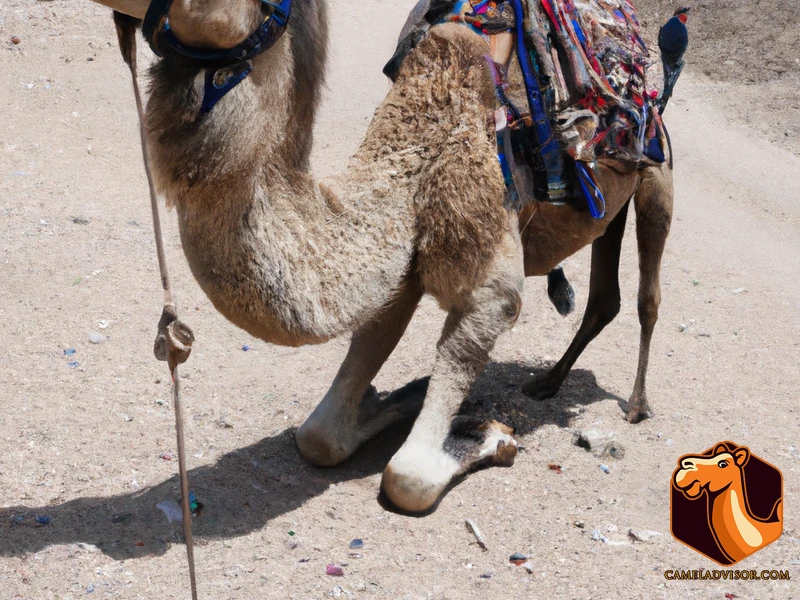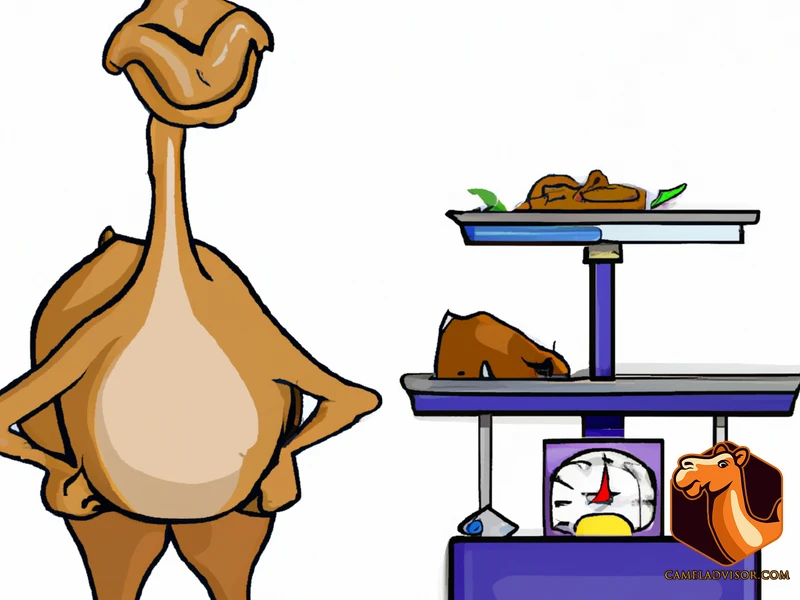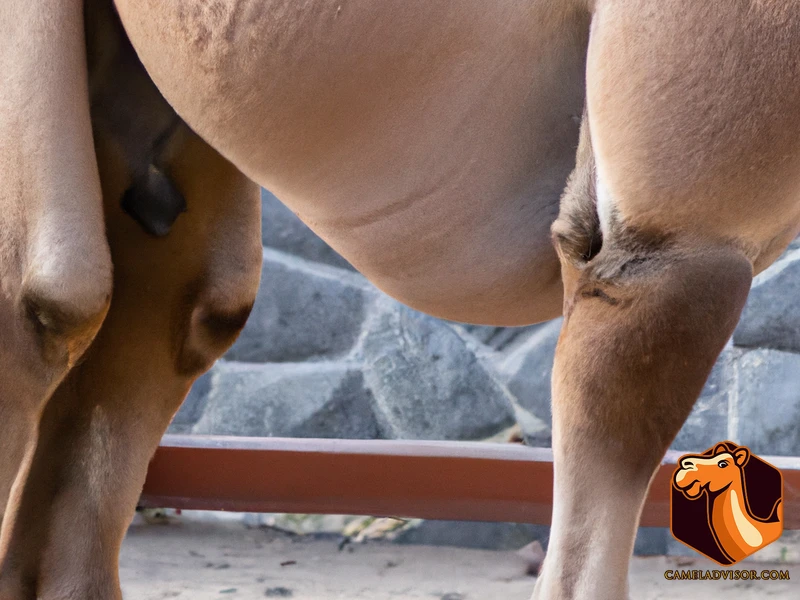Contents
- The Dangers of Overfeeding Camels
- Health Problems Caused by Overfeeding
- How to Prevent Overfeeding
- The Importance of Proper Nutrition
- Conclusion
-
Frequently Asked Questions
- What is considered overfeeding for camels?
- Can overfeeding camels cause obesity?
- What are some metabolic disorders that overfeeding can cause in camels?
- How can overfeeding camels affect their digestive health?
- What are some signs of overfeeding in camels?
- What are some ways to prevent overfeeding camels?
- What should be included in a camel’s diet?
- How often should camels be fed?
- Can underfeeding also be harmful to camels?
- What is the importance of proper nutrition for camels?
- References
The Dangers of Overfeeding Camels

Overfeeding camels can have serious consequences on their health and well-being. Camels are hardy creatures that can survive within harsh environments, but their digestive system is not equipped to handle excessive food. The digestive system of camels is specifically designed to extract as many nutrients as possible from low-quality food sources, and overfeeding them can overload their metabolic functions.
Obesity is one of the most common problems that occur as a result of overfeeding. Obesity affects not only the physical appearance of a camel, but also their health. An overweight camel has an increased risk of developing other health problems such as metabolic disorders and heart disease. This is because an excessive amount of fat can put additional stress on the camel’s joints and organs.
Metabolic Disorders can occur in camels that are overfed on carbohydrates and fats. Overloading the camel’s metabolism causes insulin resistance, which in turn can lead to metabolic disorders such as diabetes. Diabetes can affect the camel’s entire body, including their kidneys, liver, and cardiovascular system.
Digestive Issues are another major problem that can arise from overfeeding camels. When a camel consumes too much food or rich food too quickly, they can develop bloating and other digestive symptoms such as colic or diarrhea. These symptoms can be very severe and often require medical intervention.
To prevent these problems, it is important to understand the nutritional needs of camels and their food intake. Providing a balanced and fiber-rich diet while controlling their food consumption and providing adequate exercise can help prevent overfeeding. One must also understand the negative effects of feeding camels improper nutrition such as insufficient or excess amount of water, salt, and vitamins.
Overfeeding camels can have severe negative consequences on their health and well-being, including obesity, metabolic disorders, and digestive issues. Proper feeding practices are essential to maintain the nutritional balance required for their healthy and happy existence.
Health Problems Caused by Overfeeding
Overfeeding camels can have serious consequences on their overall health and well-being. The excessive intake of food can lead to various health problems that can cause discomfort and even decrease their lifespan. Understanding the health risks that come with overfeeding camels can help owners take the necessary measures to ensure their animals remain healthy and happy. It is important to note that proper nutrition plays a crucial role in not only preventing overfeeding but also maintaining a balanced diet to meet the nutritional requirements of the animal. In this section, we will explore the various health problems caused by overfeeding camels and the importance of understanding their nutritional needs to prevent these issues.
Obesity
Overfeeding camels can lead to several health issues that can affect the overall well-being of these animals. One of the most common problems caused by overfeeding is obesity.
| Effects of Obesity in Camels | Consequences |
|---|---|
| Difficulty moving around | Camels become lethargic and may refuse to move around or work |
| Joint problems | Carrying excess weight puts stress on the joints, leading to joint pain, arthritis, and even lameness. |
| Decreased reproduction | Obese female camels may have difficulty conceiving or may produce fewer offspring. Obese males may have decreased fertility. |
| Increased risk of metabolic disorders | Obese camels are at a higher risk of developing metabolic disorders such as insulin resistance and diabetes. |
Obesity in camels can be prevented by controlling their food intake and ensuring that they receive adequate exercise. It’s also important for camel owners to understand the nutritional needs of their animals and to provide them with a balanced diet that includes an appropriate amount of fiber, protein, and vitamins. For more information on the benefits and drawbacks of feeding camels salt, readers can follow the link to Benefits and Drawbacks of Feeding Camels Salt.
Metabolic Disorders
Overfeeding camels can lead to metabolic disorders, which can have detrimental effects on their health. Metabolic disorders are conditions that affect the normal functioning of the camel’s metabolism, which is responsible for converting food into energy. These disorders can lead to serious health problems and even death if left untreated.
One common example of a metabolic disorder in camels is laminitis, which is also known as founder. Laminitis is a painful inflammation of the feet that can cause lameness and difficulty walking. It can be caused by overfeeding, especially of high-carbohydrate feeds such as grains and sweet treats.
Insulin resistance is another metabolic disorder that can be caused by overfeeding. Insulin resistance occurs when the cells in the camel’s body become less responsive to insulin, which is the hormone that regulates blood sugar levels. This can lead to high blood sugar levels, which can cause a range of health problems including weight gain, laminitis, and even type 2 diabetes.
In order to prevent metabolic disorders, it is important to ensure that camels have a balanced diet that meets their nutritional requirements. Camels require a diet that is high in fiber and low in carbohydrates and sugars. They also need plenty of water to help aid digestion and prevent dehydration.
It is also important to control their food intake and provide them with adequate exercise to help burn off excess calories. Regular exercise can help prevent obesity and other health problems caused by overfeeding.
Overfeeding camels can lead to serious health problems, including metabolic disorders. By understanding their nutritional needs and providing them with a balanced diet and adequate exercise, we can help prevent these disorders and ensure the health and well-being of our camels.
Digestive Issues
When camels are overfed, it may lead to a variety of digestive issues. These issues can range from mild stomach discomfort to more serious conditions like colic and diarrhea.
One of the main reasons for these digestive issues is that camels are adapted to survive in arid environments with limited food availability. As such, their digestive systems are designed to extract the maximum amount of nutrients from whatever food they consume. This means that when they are overfed, their digestive system can become overwhelmed, causing issues.
Some common digestive issues caused by overfeeding camels include:
| Issue | Symptoms |
|---|---|
| Stomach Discomfort | Loss of appetite, bloating, reluctance to move or stand |
| Colic | Severe abdominal pain, sweating, lethargy, difficulty standing or lying down |
| Diarrhea | Watery or loose stool, dehydration, weight loss |
| Constipation | Difficulty passing stool, bloating, reduced appetite |
These digestive issues not only cause discomfort and pain for the camel, but they can also lead to other health problems if left unchecked. For example, if a camel experiences severe diarrhea, it can quickly become dehydrated, leading to electrolyte imbalances and other health complications.
To prevent digestive issues:
- It is important to monitor their food intake and prevent them from overeating.
- Camels should be fed a diet that is high in fiber and low in fat to support their digestive system. Ensure that the feed they are given is appropriate to their current state of life, whether it be pregnancy, lactation or just general health.
- Camels should be provided with clean, fresh water at all times. Water is important for digestion and preventing constipation.
By taking these proactive steps to prevent overfeeding and maintain proper nutrition, camel owners can help ensure the digestive health of their animals. In cases where digestive issues do arise, it is important to consult a veterinarian as soon as possible to prevent any serious complications.
Click here to learn more about the importance of fiber in the diet of camels.
How to Prevent Overfeeding

As much as we love our camels, overfeeding them can cause serious health problems that could have been easily avoided. Whether it’s due to a lack of understanding their nutritional needs or just overindulging them, it’s important to know how to prevent overfeeding. In this section, we’ll discuss a few measures that will help keep your camel healthy and thriving. One important way to prevent overfeeding is to make sure you understand their nutritional needs. You can learn more about the bone health requirements, protein needs, and vitamin deficiencies of camels through the links to our previous articles provided below.
Understand Their Nutritional Needs
To prevent overfeeding camels, it is important to understand their nutritional needs. Camels are adapted to survive in harsh environments; their bodies can store fat and water, enabling them to go without food for several days. However, when presented with abundant food, they will eat and overeat, leading to health problems.
Camels require a balanced diet that includes roughage, such as hay and grass, as well as grains and supplements. They also need access to clean water at all times. The amount of food and water they need depends on their age, weight, and level of activity. For example, pregnant and lactating camels have higher nutritional requirements than non-pregnant ones, as they are providing milk to their young. In contrast, older camels may need less protein in their diet.
To ensure that camels are receiving the proper nutrition, it’s important to monitor their weight and body condition. Undernutrition can lead to vitamin deficiencies, weakened bones (source), and other health problems. Overnutrition, on the other hand, can lead to obesity, metabolic disorders, and digestive issues, which can impact their overall wellbeing.
It’s important to work with a veterinarian or animal nutritionist to develop a diet plan that meets a camel’s specific needs. This may include adjusting the amount of food offered, as well as the type and amount of supplements. For example, lactating camels may need additional protein (source) in their diet to support milk production, while camels living in hot, dry environments may need additional water (source) to prevent dehydration.
Understanding a camel’s nutritional needs is key to preventing overfeeding and ensuring that they receive a balanced diet. By providing the appropriate food and supplements, and monitoring their weight and body condition, camel owners can promote their health and wellbeing.
Control Their Food Intake
To prevent overfeeding, it is important to control the food intake of camels. This can be done in a variety of ways, such as limiting their access to food or monitoring the amount they eat. One effective method is to use a feeding schedule and stick to it. This can be especially important for camels who are used to being fed at certain times.
Another way to control their food intake is to divide their meals into smaller portions throughout the day, rather than giving them one large meal. This can help prevent overeating and also aids in digestion.
It is also important to monitor the nutritional content of the food given to camels. This includes ensuring they are getting the proper amount of protein and vitamins, as well as avoiding foods that are high in sugar or fat.
Overfeeding can lead to various health problems in camels, making it important to take steps to prevent it. By controlling their food intake, owners can ensure their camels maintain a healthy weight and avoid metabolic disorders and digestive issues.
To learn more about how much protein camels need, check out our article on “How Much Protein Camels Need.” Additionally, inadequate vitamin intake can also affect the health of camels. Read our article on “Vitamin Deficiencies in Camels” to learn more about this topic.
Provide Adequate Exercise
Camels are built to move across long distances, and they require regular exercise to maintain their health. As such, it’s important to provide adequate exercise to prevent obesity and other health problems associated with overfeeding.
Exercise can be provided in several ways, such as walking, running, or even playing with other camels. The amount of exercise needed will depend on the camel’s age, breed, and health status. A good rule of thumb is to provide at least 30 minutes of moderate exercise per day for adult camels.
To ensure that camels are getting enough exercise, it’s important to establish a routine. This can be done by scheduling regular walks or runs, or by allowing camels to graze in a larger area where they will naturally walk around more.
Here is a table outlining some additional ways to provide adequate exercise for camels:
| Method | Description |
|---|---|
| Walking | Regular walks on a lead or in an open field |
| Running | Allowing camels to run free in a large enclosed area |
| Playing | Providing toys or other forms of entertainment to encourage movement and play |
| Training | Training camels for performance or work, such as carrying or pulling |
Providing adequate exercise is crucial in preventing health problems caused by overfeeding. By establishing a routine and incorporating different forms of movement and play, camel owners can ensure their animals stay healthy and happy.
The Importance of Proper Nutrition
Providing proper nutrition to camels is vital for their overall well-being and longevity. Camels require a specific diet that is rich in fibers to maintain their health. The diet should contain a balanced combination of hay, grains, and minerals that provides the necessary energy for their daily activities.
Nutrients are essential for camels’ physical growth and immune system. Minerals and vitamins are necessary for their bones, teeth, skin, and coat health. Insufficient intake of nutrients can lead to malnourishment, weakness and affect their immune system. Hence, it’s essential to provide a well-balanced diet that accommodates all their needs.
Lack of nutrients can also make camels prone to metabolic disorders. Metabolic disorders occur when camels consume more food than they need, leading to a buildup of metabolic waste. Resultant metabolic abnormalities can cause severe conditions ranging from laminitis to thickened arterial walls. Hence, it is crucial to feed camels proportionately to their daily activities.
Furthermore, dehydration can cause health issues in camels. Providing clean water is essential, as camels tend to drink a lot of water in a single sitting to compensate for their time in the dry environment. Water helps to regulate their body temperature, improve digestion and prevent urinary tract infections.
Providing proper nutrition is critical to maintaining the general health and well-being of camels. It’s essential to ensure that their diet provides necessary minerals, vitamins and fiber, feed them proportionately to their daily activities, and provide clean water to maintain hydration. A balanced and healthy diet also improves the immune system of camels, keeps their skin, coat, bones healthy and prevents them from developing obesity and other health problems.
Conclusion
In conclusion, overfeeding camels can have serious health consequences. Obesity, metabolic disorders, and digestive issues are just some of the negative outcomes that result from excessive food consumption. Therefore, it is crucial for camel owners to understand their nutritional needs and control their food intake accordingly.
Providing adequate exercise is also essential for maintaining a healthy weight and preventing health problems. Proper nutrition is key in ensuring that camels receive the necessary vitamins, minerals, and nutrients they need to thrive.
Camel owners must be knowledgeable about the dangers of overfeeding and take necessary steps to promote a healthy lifestyle for their camels. Regular veterinary check-ups can also help identify any health issues that may arise from improper feeding habits.
In summary, overfeeding camels can have detrimental effects on their health, but with proper care and attention, camel owners can ensure their animals lead happy and healthy lives.
Frequently Asked Questions
What is considered overfeeding for camels?
Camel overfeeding occurs when they consume more food than they require to meet their nutritional needs.
Can overfeeding camels cause obesity?
Yes, overfeeding camels can cause obesity, which can lead to health problems.
What are some metabolic disorders that overfeeding can cause in camels?
Overfeeding can cause disorders such as insulin resistance, metabolic acidosis, and liver disease in camels.
How can overfeeding camels affect their digestive health?
Overfeeding can cause digestive issues such as bloating, constipation, and diarrhea in camels.
What are some signs of overfeeding in camels?
Signs of overfeeding in camels can include obesity, lethargy, and a decrease in activity and energy levels.
What are some ways to prevent overfeeding camels?
To prevent overfeeding camels, it is important to understand their nutritional needs, control their food intake, and provide adequate exercise.
What should be included in a camel’s diet?
A camel’s diet should include hay, grass, grains, and supplements to ensure they receive the proper nutrition.
How often should camels be fed?
Camels should be fed 2-3 times per day, and their food intake should be monitored to prevent overfeeding.
Can underfeeding also be harmful to camels?
Yes, underfeeding camels can lead to malnourishment, which can cause various health issues.
What is the importance of proper nutrition for camels?
Proper nutrition is crucial for maintaining the health and well-being of camels, as well as preventing health problems caused by overfeeding or underfeeding.







